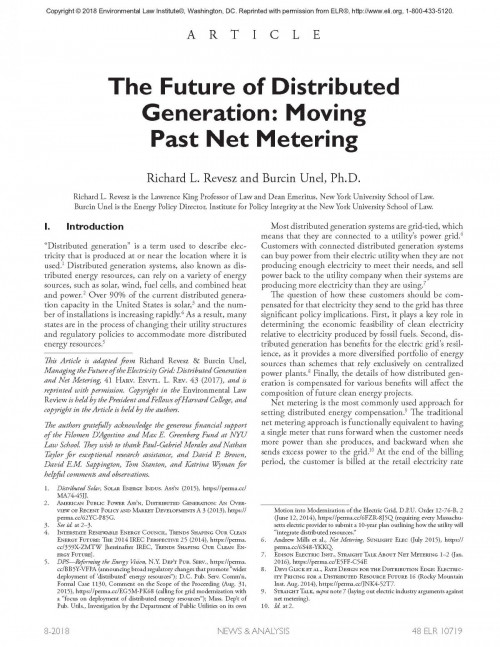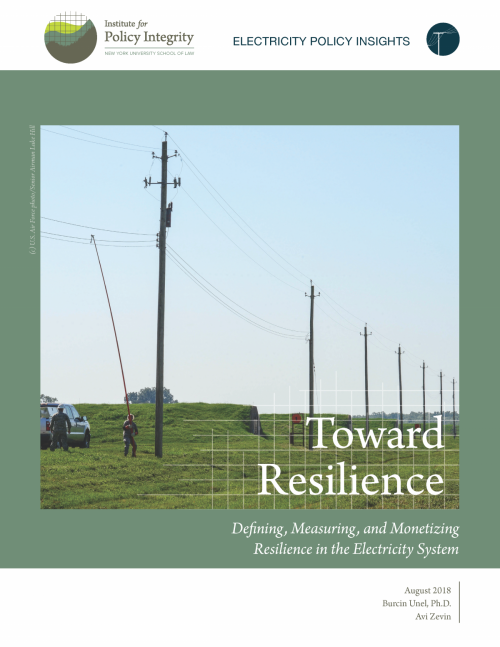-
Comments to EPA on Weakening the Chemical Disaster Rule
In May 2018, EPA proposed to repeal significant portions of the Chemical Disaster Rule, a rule that would have improved safety procedures at chemical plants. In response, we submitted comments highlighting the ways in which this proposed deregulatory action is arbitrary and capricious
-
Comments to EPA on Increasing Transparency in Cost-Benefit Analysis
Claiming an unsubstantiated need to improve consistency and transparency in its economic analyses, the Environmental Protection Agency (EPA) is considering revisions to how it weighs costs and benefits in rulemakings. In our comments to EPA, we argue that this proposal is searching for a problem that does not exist. In implying that the agency’s past analyses have somehow inappropriately considered costs and benefits, EPA relies on vague or false assumptions and misleading examples. In fact, through 2016, EPA’s past analyses of regulatory costs and benefits were among the most thorough, consistent, and transparent regulatory impact analyses conducted in the federal government and had justified some of the most net beneficial rules in the history of federal regulation.
-
Comments to FERC on a Natural Gas Project EIS
We recently submitted comments to the Federal Energy Regulatory Commission on a natural gas processing and storage facility and marine export terminal in Louisiana, the Calcasieu Pass Project. While the DEIS quantifies the tons of greenhouse gas emissions related to this project—almost 4 million metric tons of carbon dioxide per year from operations, plus hundreds of thousands of tons per year during construction—FERC fails to apply the social cost of greenhouse gas metric to fully account for the climate effects of these emissions. Once again, FERC resorts to flawed arguments used in other inadequate NEPA reviews to implicitly justify why the Commission chose not to use the social cost of greenhouse gases metric for the Calcasieu project. Our comments provide a detailed rejection of FERC’s arbitrary and misleading rationale for failing to use the social cost of greenhouse gases, and offer additional guidance on how to monetize climate effects consistent with the currently best available science and economics.
-
Comments to EPA and Army Corp on Supplemental Notice for Clean Water Rule
Following a Proposed Repeal of the 2015 Clean Water Rule, the Environmental Protection Agency (EPA) and Army Corp of Engineers issued a Supplemental Notice in July 2018 regarding the Proposed Repeal. We previously submitted comments to the agencies on the Proposed Repeal explaining that the economic analysis accompanying that Proposed Repeal was fundamentally flawed. In this notice, the agencies state that they are “not relying” on that economic analysis.
-
Policy Integrity Article Cited in Suit Against Interior’s Royalty Policy Committee
A group of NGOS, led by the Western Organization of Resource Councils, recently filed a complaint in the District of Montana Court regarding Secretary of the Interior Zinke’s Royalty Policy Committee (RPC). The complaint argues that though the RPC should be acting transparently on behalf of American taxpayers, it is in fact working in secret to advance the interest of extractive industries. In the complaint, the petitioners cite a recent Harvard Environmental Law Review article by Policy Director, Jayni Foley Hein, Federal Lands and Fossil Fuels: Maximizing Social Welfare in Federal Energy Leasing, to help make their case.
-

The Future of Distributed Generation
Moving Past Net Metering
This article provides an overview of the benefits and the costs of distributed generation and highlights the analytical flaws and missing elements in the competing positions and in most existing policies. We propose an alternative approach that recognizes the contributions to the electric grid of both utilities and distributed generators. The article is excerpted and revised from a longer academic article, “Managing the Future of the Electricity Grid: Distributed Generation and Net Metering,” which was selected by Environmental Law Reporter as one of the five best environmental law articles published in the 2017-2018 academic year.
-
Comments to Interior on Offshore Oil Well Control Revisions
After the Deepwater Horizon explosion and oil spill, the Department of the Interior’s Bureau of Safety and Environmental Enforcement (BSEE) issued regulations designed to improve the safety of offshore drilling operations. Finalized in 2016 after six years of extensive public involvement, these safeguards are now in the process of being rolled back by BSEE. Our comments to BSEE argue that it should not move forward with its notice of intent to repeal and/or modify the Blowout Preventer Systems and Well Control Rule, because BSEE has not provided a reasoned explanation for weakening and repealing safety requirements that it found necessary in 2016. BSEE must analyze all of the forgone societal benefits from rolling back the finalized safeguards, including safety and environmental risk reduction, time savings, industry cost savings, reduced fatalities, and lower externality costs.
-
Positive Ruling in Case on BLM Climate Impacts Leasing
A District of Montana judge recently ordered that the Bureau of Land Management (BLM) must update two resource management plans (RMPs) for the Powder River Basin in order to better assess the plans’ climate impacts. Dr. Peter Howard, our Economics Director, submitted an expert declaration in the case in May on the environmental, public health, and social welfare costs of the RMPs, focusing on the social cost of greenhouse gases metric. The suit was brought by the Western Organization of Resource Councils, with other NGOs, against BLM for failing to conduct a sufficient analysis of the climate effects of possible fossil fuel leasing, in violation of the National Environmental Policy Act. Because almost half of the country’s coal is mined in the Powder River Basin, there are significant greenhouse gas emissions implications for mineral leasing in the area.
-

Toward Resilience
Defining, Measuring, and Monetizing Resilience in the Electricity System
Grid resilience—generally, the electric grid’s ability to resist/absorb, manage, quickly respond, and recover from/adapt to high-impact, low-probability external shocks—has been a concern for electric utilities and energy planners for decades. While recent extreme weather and cyber security concerns have prompted the federal government to pursue policies that support coal and nuclear power plants, a more systematic focus on resilience will lead to very different solutions than what has been proposed by the Department of Energy. Our report aims to assist policymakers in understanding grid resilience and evaluating potential interventions aimed at improving grid resilience.
-
Comments to HHS on Restricting Public Funding for Family Planning Services
The Department of Health and Human Services (HHS) recently issued a proposed rule that would revise implementing regulations for Title X of the Public Health Service Act (Title X), the country’s only publicly funded family planning, serving millions of women annually. Though the grant program is already bound by the legal limits on directly using federal grants to fund abortion services, the proposed rule now seeks to encumber entities that provide both Title X-eligible programs and abortion-related services with additional restrictions. Our comments focus on serious errors and oversights in the Department’s analysis of the Proposed Rule’s costs and benefits. First, HHS misstates and misapplies the standard for conducting a regulatory impact analysis under Executive Order 12,866. Second, HHS ignores the Proposed Rule’s potentially substantial indirect costs—most notably, the health consequences stemming from patients’ reduced access to healthcare services. Third, HHS fails to assess the distributional impacts of the Proposed Rule.
